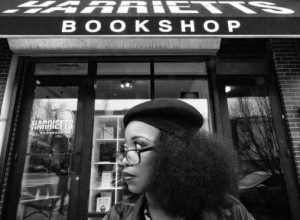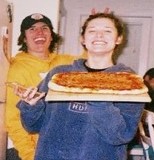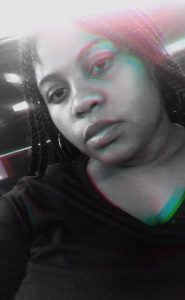
Feral Wives
The Feral Wives have left us, that much is clear. What is less clear is why, and for how long. Surely their absence must be an aberration, a temporary detour from the long, slow, steady march of civilization. For how would we go on without them? And they without us?
We know so little. Their means of survival, their patterns of migration, their social structure—if they can be said to have one—all remain mysterious. We can theorize, of course, but little can be said with any certainty. We have learned that they tend to travel in groups of six to twelve—though communities of twenty or more are not unknown. They prefer to stay on the move, building temporary shelters from the materials close at hand and then disassembling them, so that the only traces they leave behind might be a pile of sticks and leaves, a charcoal pit, a few bones. And yes, they hunt, fish, and trap, though we have little idea how, since they do not appear to be armed in the conventional sense. They seem to know things that we have lost, and to have lost things that we know.
Those who are returned to us—sometimes by misadventure, more often by force—are of little help. They understand our questions but do not answer them. Have they been sworn to secrecy? Attempts to reintegrate them inevitably fail. In extended periods of captivity—for this is clearly how they see it—they become despondent, sometimes even catatonic. We can warehouse them, or we can set them free. Either way, they no longer belong to or among us.
***
We were at a rest stop somewhere in Ohio when Katrina finally bolted.
She’d been slumped over in the passenger seat all morning, face pressed against the glass, staring out at the monotonous landscape of fields, farms, and factories scrolling by on the turnpike. I was at the wheel, trying to put as many miles as possible behind us, with the vague notion that a change of scene might mean a change of outcome. The girls rode in the back, uncharacteristically quiet, Chelsea clinging to her phone, Greta to Mr. Tiddles, her stuffed rabbit. They were anxious, looking to us for cues on this odd, unexpected journey. I had none to offer.
To the extent that I had a plan, it was to keep driving west, chasing the sun until it set, then find a cheap motel for the night. Rinse and repeat. I’d thought maybe we could outrun destiny, and if not, then at least we’d be on the run as a unit. Maybe at some point we’d just ditch the car and the hastily packed suitcases and tramp off into the wilderness together. That didn’t seem to happen to others, but why couldn’t we be different? Or maybe we’d just keep going, all the way to the Pacific, and then . . . what?
Something made Katrina perk up. She raised her head and squared her shoulders, the muscles on the back of her neck tensing. I stole a sideways glance out the passenger window to see what might have caught her attention, but it was just the same thing we’d been seeing for hours: rows of soy and corn stretching into the distance, punctuated by an occasional barn or silo. Perhaps sensing my gaze, she turned to face me. Her eyes, curtained by wisps of her long blond-going-to-gray hair, were open wide, pupils dilated. She was looking, not at me, but right through me, beyond me, to something that wasn’t there, or not yet there, though I had the feeling that the sheer intensity of her gaze could almost bring it into being, whatever it was. Not for the first time in recent weeks, I also had the visceral sense that I was no longer looking at my wife of fourteen years but at a complete stranger. God knows what she saw when she looked back at me.
The angry blast of a truck horn in the left lane snapped my attention back to the road. I’d been drifting, and I jerked the wheel to the right as an oil tanker whizzed by mere inches away.
“What is it, Dad?” said Chelsea, her voice tight with worry. “What happened?” At nine, to her sister’s four, Chelsea had become their spokesperson for the trip.
“It’s fine, honey,” I told her. “I was just getting a little too close to that truck, so he was letting me know.”
“Mom, what were you looking at over there?” she asked.
“Nothing,” said Katrina absently. “Go back to sleep.” Neither girl had slept a wink since we’d left our home in Harrisburg in the early dawn.
“I have to pee,” said Greta.
“How bad, muffin?” I asked. “Can you wait a little while?”
“Kinda bad,” she said. In the rear-view mirror I could see her squirming in her seat. She hugged Mr. Tiddles so tightly that his torso slumped forward, his long ears drooping over her tiny thighs.
I sighed. “OK, let me see what I can do.” I’d been holding on myself since at least Pittsburgh and had finally reached that point of Zen where my angry bladder seemed to belong to someone else. Now, with the prospect of relief, the urgency returned. I saw a sign ahead promising a rest stop in five miles.
“Hang in there,” I told Greta, taking the Subaru up to eighty to pass a row of cars and trucks in the right-hand lane. In four minutes flat we were pulling into the Muskingum County Rest Area. We drove past a long line of stopped tractor trailers and turned into one of the angled parking spaces for cars. Ahead, up a paved walkway, was the visitor center, a low concrete building with a flying-saucer-shaped metal roof. A path to the right led to a pavilion with a few empty picnic tables, beyond which lay grassy hills with stands of tall oaks, and, beyond that, the woods. A cell tower loomed out of the trees like a sentry.
“OK, let’s go,” I said, opening the door and unfolding my stiff legs. By the time I stood up, Chelsea and Greta were already out of the car and on their way up the sidewalk. “Wait up!” I called, but they kept going, Greta pulling her older sister by the hand toward the glass doors of the visitor center. I poked my head inside the car. “Are you coming?” I asked Katrina. “I don’t want them running off alone.”
“They’ll be okay,” she said, not looking up. “They’re survivors, Steve.”
“Alrighty, then,” I said, not wanting to argue the point. “Do you want anything? Coffee? A snack?”
She shook her head.
“We may not stop for a while after this.”
“It’s best to keep moving.”
“Suit yourself.” I pushed the door closed and hurried up the path. We’d had a lot of disconnected conversations like this lately, and I was running out of patience. So, apparently, was she.
The bathroom stop turned into a snack run, which was quickly upgraded to lunch, and then I couldn’t resist getting in line at the Starbucks for an iced mocha latté, my one weakness. By the time we emerged from the building, laden with greasy bags and sweaty drinks, Katrina was gone. Not only that, but she’d left the passenger door wide open, with all of our stuff in plain view of anyone wandering by.
“Where’s Mom?” asked Greta.
“I guess she went for a walk,” I said. She’d left her phone in the cup holder between the seats, and her suitcase was still with the others in the luggage compartment. I scanned the surrounding area but saw no sign of her. A wave of panic rose from my gut to my chest and lodged there. I didn’t want to alarm the girls, so I said, “Let’s go over to the picnic tables. We can eat our lunch while we wait for her to come back.”
She didn’t come back.
“Maybe she’s inside, looking for us,” I said, though I didn’t really believe it. “Let’s go check.”
We dumped the remains of our picnic into the waste bin and headed for the building. Several couples passed us on their way out, retirees in tennis shoes and oversized sweatshirts. The kind of people you saw on the road in late September. We must have seemed out of place, and perhaps a bit panicky, as we attracted looks of curiosity and concern. One of the women leaned over and whispered something to her husband, then gave the girls a sympathetic nod. Save your pity, I thought. We’ll be fine.
The visitor center was humming with activity, as people headed in every direction at once, alone and in clumps. I looked around the place and saw no sign of Katrina. I sent the girls into the women’s room, but they returned without their mother. We combed the food court, to no avail. I asked some of the employees if they’d seen a fortyish woman in jeans and a fuzzy brown sweater. Not much to go on, I realized, but we had to try. They just shrugged. Greta began to cry, and Chelsea took her by the hand. More people were staring at us now. More whispers and knowing looks.
“She must be outside,” I said. “C’mon, let’s go, girls.”
We walked the perimeter of the rest area, where the mown grass gave way to woods, calling “Katrina” and “Mom” at the top of our lungs. The dark, silent forest swallowed our cries. The only other sound was the rumble of trucks out on the highway. I saw no paths or obvious points of entry, just weeds and underbrush, thorns and poison ivy. Discarded candy wrappers, Styrofoam cups, and plastic bags had blown up against the edge of the wood, like sea foam washed up by the tide. The idea of stepping over them and into that dense mess of foliage with the girls in tow made me deeply uneasy. So did the idea of leaving them standing there at the edge of the wood.
We went over the entire rest area twice, then returned to the car and sat with the windows down. Greta continued crying and sniffling, while Chelsea stroked her sister’s hair and I sat in the front thinking about next steps. It was Chelsea who finally broke the silence. “We lost her, Dad,” she said.
It sounded like an accusation.
***
HOST: Welcome back. I’m Megan McCready, and this is “Here and Now.” Today we’re talking about the so-called Feral Wives. Who are they? Why are they leaving? Where are they going? What can we do to bring them back? Joining me this morning are two experts: Roger Reed of MROWWW. Roger, why don’t you tell us what that stands for?
ROGER: Sure. It’s Men Rebuilding Our World Without Women.
HOST: Welcome.
ROGER: Pleased to be here.
HOST: And over here we have Vanessa van der Velde, professor of women’s studies at Barnard College and author of Fleeing to the Future: Manifesto for a New Feminism. Professor van der Velde, thanks for joining us.
VANESSA: My pleasure. And just Vanessa is fine.
HOST: Roger, let’s start with you. Why do you think this is happening, and why now?
ROGER: Well, it’s pretty clear, really. As a species we’ve reached a breaking point. For millennia, human society was shaped around a simple concept: the nuclear family, with one man, one woman, and their biological offspring.
VANESSA: Not al- . . .
ROGER: And it worked, or at least it worked well enough that every society in the world ended up adopting some version of this model and building a cosmology around it.
VANESSA: Not ev- . . .
ROGER: And the reason it worked was because there were clearly defined roles and a hierarchy for enacting and enforcing them, with the woman as the primary caretaker, and the man as the head and decision-maker.
VANESSA: Whoa, I . . .
ROGER: But in the last, let’s say, five decades or so, there’s been a coordinated effort to undermine the natural order of things and replace it with something else, something based on destructive and misguided notions of fairness and equality.
VANESSA: What’s mis- . . .
HOST: So you blame feminism?
ROGER: No, not at all, Megan. I blame men.
VANESSA: Can I just . . .
HOST: Why do you blame men?
ROGER: For being weak. Too many of us have abdicated our natural role, and it’s left our women rudderless. They’re leaving because we haven’t been fulfilling our social and biological imperatives as the male of the species.
HOST: Which are?
ROGER: I call it the three P’s: Provide, Protect, and Preside.
VANESSA: If I may . . .
ROGER: It’s like the proverbial three-legged stool. You take away one leg and the whole thing collapses. I’d argue that all three are eroding, and what we’re seeing now are the consequences.
HOST: And you, Vanessa, how about it? Do you think Roger is right?
VANESSA: I couldn’t disagree more. He’s right that we’ve had centuries of patriarchy but look where it’s gotten us. A planet on the brink of disaster, a society that’s literally being pulled apart. And all because of men’s insatiable need to dominate everything—women, nature, each other. This is what’s driving these women away. They’re returning to nature as allies against a system that aims to destroy everything. It’s a survival instinct . . .
ROGER: Vanessa, Vanessa, please, you know that just isn’t true. Our survival as a species has always depended on subduing and exploiting nature at every turn. That’s the whole basis of civilization, going all the way back to the Fertile Crescent.
VANESSA: Fertility is nature, Roger, and women . . .
[Crosstalk]
HOST: We have to . . .
[More crosstalk]
HOST: We have to break for commercial. I want to thank you both for being here. When we come back, we’ll be joined by a bounty hunter who’s been reuniting families across the country. He calls it rescue, others say it’s kidnapping. What do you think? Stay tuned.
***
We stayed in the rest-stop parking lot until dinnertime. I knew with increasing certainty that Katrina was gone, but I was reluctant to leave in case she changed her mind. If we left, how would she ever find us? We made several trips to the visitor center for various things, and to have another look around the premises. And then it started to get dark, and the girls were getting restless and asking too many questions I couldn’t answer, so I decided it was time to move on. But first we had to leave a note or something inside.
I herded the girls into the visitor center one last time, looking for someone official to ask about where to leave a notice. The best I could do was a uniformed janitor emptying trash cans in the food court. I explained our dilemma, and he pointed to a kiosk against the wall that I’d somehow overlooked in our previous passes through the building. Under a sign that read “Have You Seen Us?” was a unit that could easily have been mistaken for an ATM. On the screen, at roughly six-second intervals, appeared a succession of captioned photos of women: “Regina Simpson / Age 36 / Last seen Steubenville, Ohio / August 7, 2023. If located, please contact….” Regina was pictured seated at a table and clutching a large kitchen knife in her hand, blade pointed toward the ceiling. On the table in front of her was a birthday cake, candles ablaze. She was facing the camera, and there it was again, that look I’d seen in my wife’s eyes just hours earlier, gazing past us, through us, into a future we couldn’t see. A wave of vertigo swept over me, and I clutched the edges of the counter to steady myself. Then the picture was replaced by another, and the feeling passed.
A green button to the lower right of the screen was labeled “New Entry.” Reluctantly, I pressed it, and a touchscreen menu appeared. I entered Katrina’s name, date of birth, and “Last seen Muskingum County Rest Area, Ohio,” along with the date and contact info. All that was left was to upload a photo. I pulled out my phone and began scrolling through the gallery: memes, pictures of the girls on their bikes, of a fender-bender I’d been involved in a few months earlier, of the girls in last year’s Halloween costumes, more memes . . . did I really not have a picture of Katrina?
“Chelsea, do you have a decent picture of Mom on your phone?”
After much discussion, we settled on one from last summer, of Katrina kneeling in the garden. She was looking at the camera and smiling, her hand cupped around a large, ripe tomato. We uploaded the photo and then stood there, waiting for it to come around on the screen. After a couple of minutes, she appeared among the procession of the missing and then was gone from us again. For the first time that day, I felt tears gathering at the corners of my eyes.
***
DESPITE SETBACKS, PA HUNTERS HARVEST 74 ELK THIS SEASON
HARRISBURG, PA – Eighty-nine hunters took part in Pennsylvania’s one-week general elk hunt, which closed Nov. 9. Most left elk country with a trophy. For those licensed to hunt bulls, the success rate was 100 percent.
The harvest included eleven bulls estimated to weigh 700 pounds or more. The heaviest, taken in Clinton County, tipped the scales at 800 pounds and had a 10-by-9 rack. Some hefty antlerless elk were also taken in the harvest. Ten of the 62 cows taken by hunters weighed over 500 pounds.
Harvest numbers were down somewhat from previous years, due to the closure of several areas following sightings of non-hunters in the vicinity. State Game Commission wardens also investigated several reports of unlawful harvesting, including the partial remains of one bull discovered in Carbon County. No arrests were made.
All hunters are urged to use caution due to increased activity in state game areas unrelated to licensed harvesting of wildlife. Accidental shooting incidents such as those reported in Illinois, Michigan, and Tennessee have not occurred in Pennsylvania to date. We’d like to keep it that way.
—Pennsylvania State Game Commission Bulletin
***
The closest motel I could find was two exits and twenty-some miles away. The taciturn Indian-American couple who ran the place handed over the keys without comment, and Chelsea and I unloaded the bags and brought them in while Greta stood outside in the pale yellow glow of a streetlight, clutching Mr. Tiddles and sucking her thumb.
“Greta,” I said as I emerged from the room for a second load, “Thumb.” We’d made a bargain whereby she got to take Mr. Tiddles everywhere in exchange for not sucking her thumb.
“Dad, leave her alone,” said Chelsea.
“We can’t suspend the rules just because Mom isn’t here.”
Greta threw Mr. Tiddles to the pavement, stomped into the motel room, and slammed the door.
“Nice going,” said Chelsea.
“You know, you could cut me a little slack,” I said. “It’s not like this is easy for me.”
She rolled her eyes, retrieved the rabbit from the sidewalk, then joined her sister in the room, closing the door behind her.
“Chelsea, Greta, I’m sorry!” I called after them.
I tried the door. It was bolted from the inside.
After much cajoling, I managed to get them out of the room and back in the car, and we drove off in search of a restaurant. The motel owners hadn’t been especially helpful, but it seemed there was a diner a couple of miles down the road. After driving back and forth through the town, which was really just a cluster of dull clapboard houses with rusting cars in the driveways and plastic toys on the lawn, we finally spotted the neon sign on a side road that led back in the direction of the interstate. It didn’t look promising—just a dull stainless-steel-plated box of a place, with a handful of old cars and trucks parked out front—and I was half-tempted to drive the twenty-five miles back to the rest stop for Sbarro or Wendy’s, but the weight of the day was settling over me like a damp wool blanket. I needed a meal and a bed, perhaps not even in that order. I pulled into the lot and parked.
In contrast to the dingy exterior, everything inside was bright and shiny and smelled like disinfectant, even the menus, which were almost as large as the Sunday comics section. Our waitress, whose name was Sandy, wore a white uniform and a cheerful smile that seemed like an extension of the decor. She asked where we were from and where we were going. The first one was easy, the second one not so much. I was about to say that we were “headed west,” but Greta beat me to the punch.
“Our mommy ran away today,” she said.
“Oh, darling, I’m so sorry. You must be worried about her.”
Sandy continued talking to the girls, asking them questions about their mother, all the while ignoring me. Finally, I could stand it no longer and cut in.
“They’re fine,” I said. “We’re fine.”
“No we aren’t,” said Chelsea.
Greta, who had finally calmed down somewhat on the way over, began crying again.
I sensed a coup building and I was outnumbered, so I backed down.
Sandy brought the girls multiple refills on the sodas that came with their grilled cheese sandwiches, and then threw in two free sundaes for dessert—as though an excess of sugar would somehow soften the loss of their mother. With me she was curt and direct. “Are you finished with that, sir?” she asked, looking at my half-finished hamburger and pile of fries.
“I couldn’t eat another bite,” I said. My appetite had fled, and fatigue was settling in.
“Your check.” She slapped it face down on the table in front of me.
Is this how it’s going to be? I thought. Damnit, I’m the one who stayed behind.
Just for spite, I left her an outrageously large tip.
***
It was sometime last year when we first heard about the Feral Wives, though I don’t think they were even called that yet. It was a Sunday morning. The kids were watching TV in the den while Katrina made pancakes and I did the New York Times crossword. We had NPR on in the background, and a report came on about an unusually large number of missing-persons cases involving women in various parts of the country. The women were believed to be alive, and some had been spotted traveling in groups, usually in rural areas. Supermarkets and restaurants in these areas had also reported overnight break-ins that many thought were related to the disappearances. A local sheriff somewhere in the Midwest was interviewed, as was one of the husbands. Both seemed completely at a loss to explain the phenomenon. “I just keep waiting,” said the husband, “and wondering why.”
“That’s weird,” I said. “I mean, it sounds almost like an internet hoax to me, or some kind of hysteria. Remember all those clown sightings back in, when was that?”
“I believe this is real,” said Katrina.
“So what do you think it’s about? Why would they do this?”
“I’m sure they have their reasons.”
“Like what?”
She shrugged and looked out the window. Outside, our neighbor Ted was bent over his lawnmower, tugging repeatedly at the starter cord. Finally it turned over, chugged a few times, and roared to life.
“Everyone is different,” she said. She didn’t elaborate; I didn’t ask.
In retrospect, I probably should have.
***
Deirdre Hendricks, Ted’s wife, was the first to go. We knew them, of course, but weren’t especially close, even though one of their two boys was in Chelsea’s class at school. Word got around, along with various rumors—that she’d run off with an unknown lover, that she’d gone back to California to live with her parents, that she’d joined a religious cult—but eventually, as other women began to follow suit, we connected her disappearance with the larger trend.
We’d see Ted on the other side of the fence, puttering around in his yard, pruning the roses, scooping the leaves out of the pool, running the leaf blower along the deck. He seemed determined to act as though everything was normal, but there was a ferocity to everything he did. I felt sorry for him, of course—but also, I have to admit, a little superior. I imagined that he must not have treated Deirdre very well, after all, for her to take off like that. And there had to be something very wrong with her as well, to abandon her kids like that. I crossed paths with him once at the supermarket and mumbled a few words of sympathy, which he brushed aside in a pretty rude way. Oh well, the guy was suffering. Most of all, though, I felt bad for the boys. Whenever I saw the two of them coming or going from the house, they always had their heads down and seemed lost. Chelsea said that Ted Jr. had been getting in fights at school.
A month or so later, a police car pulled up in front of their house, and two women in uniform got out. They helped Mrs. Hendricks out of the backseat and escorted her up the walkway to where Ted and the boys stood waiting. She wore a long white gown and walked slowly and deliberately, a policewoman at each elbow. Then they all went inside and closed the door. After that, we’d see her out on the back porch now and then, usually accompanied by her husband. There was a chain anchored to one of the porch posts, and sometimes he’d lock the end of it to a little brace she wore around her ankle so he could leave her out there. She’d sit on the folding deck chair in the sun, arms draped at her sides, until he came out and brought her back in. We saw nothing of the boys anymore. Chelsea said they had stopped going to school.
Katrina and I were sitting in the kitchen one morning, drinking coffee. It was a bright, sunny day, and normally we would have been outside, but we’d stopped using the back porch so much because we never knew when Mrs. Hendricks would be out there in her chair. Not that we interacted with her, or her with us, but it was just awkward having her sitting there.
She was out there now, in fact.
“What do you suppose happened to her?” asked Katrina.
“Our sunbathing friend over there? I don’t know.”
“She looks so . . . empty.”
“Yeah, not a lot going on there.”
“But why?”
I shook my head. “Who knows? Drugs, mind control, PTSD.”
“What if she’s only sad because she’s back here?”
“What’s wrong with here?”
“What if she was better off . . . wherever she was?”
I shrugged. “I don’t see how. She was probably half-starved. I mean, what do they eat, anyway?”
I looked out the window and noticed that she was staring at us, or at least in our direction, which was unusual. Most of the time, she seemed to keep her eyes straight ahead, even when Ted was out there with her.
“She’s watching us,” I said.
And then suddenly she stood, opened her mouth, and screamed—a long, protracted shriek that was audible even through the closed windows of our kitchen. It was painful to listen to. Ted came barreling out of the house and tried to put a hand over her mouth, then quickly pulled it away. It appeared she had bitten him. They struggled for a while, until he was finally able to subdue her, unlock the chain, and drag his wife inside the house.
“That was horrible,” said Katrina. She looked pale and shaken.
“I feel so bad for those boys,” I said. “It must be hard with their mom like that.”
***
One day, Ted knocked on our back door and asked if we’d seen his wife. Apparently, he had come outside to discover her missing. Her chain had been cut neatly in two, probably by a hacksaw. Ted said he didn’t even own one, so she must have had an accomplice.
“Are you sure you didn’t see anything?” he asked. His tone had an accusatory edge, and I half wanted to throw a punch at his pinched face.
“No,” I said.
“How about your wife? Did she …”
“No.”
He stood there for a moment, then turned abruptly and walked back across the yard toward his place.
I went down in the basement and checked our hacksaw. It still hung in its usual spot over the workbench, though I couldn’t tell if it had been used recently.
A few days later, a “For Sale” sign went up in front of the Hendricks’s house.
***
THE HOMEFRONT: WHEN MOTHERS LEAVE
It has long been accepted that some fathers will leave their families behind for extended periods of time. The reasons have varied according to culture and time period, and have included military service, sea voyages, colonial adventurism, migratory labor, and numerous other pursuits that have taken men far from home and hearth. And then there are those who choose to walk away from the burdens and responsibilities that attend raising a family. Depending on the circumstances, such men may be lauded for their service, viewed as making noble sacrifices for the sake of their families, or castigated as deadbeats and losers, but the fact remains that their absence is seen as a commonplace and even necessary fact of life.
But what about women who leave their families behind? Extended absences by mothers are likely to be judged far more harshly than those by fathers. This is true even when the woman is serving in the military or working a job that involves frequent or extended travel. While the father is likely to be seen as providing for his family or sacrificing for his country, with a mother there is the negative perception that she found something “more important” than her children, and that the children will suffer as a result.
Ample evidence exists that extended maternal absence has a negative effect on the mental health of children, but it is not clear that the impact is any more severe than it is for paternal absence. Furthermore, children raised by single fathers seem to fare just as well as those raised by single mothers. So why does this disparity in perception persist?
This question has received renewed attention lately due to the so-called Feral Wives. Reports on the phenomenon in the popular press tend to treat it as a kind of epidemic, something that arose suddenly and spontaneously, with very little precedent. Although research supports the notion that the number of women abandoning their families has spiked in the past year, this also represents the culmination of a trend that began decades ago. Much of the evidence remains anecdotal, but a recent U.K. study of walk-away moms covering the years 2015–20 indicated an increase of about 12 percent per year in the number of cases. . .
—Psychology Today
***
In the weeks following Deirdre Hendricks’s second departure, other women in began disappearing. First it was Camille Fogarty, whose husband Rob was a contractor specializing in overpriced additions; then Renée Compton, who worked as a legal secretary and was married to the town supervisor; and finally, Mrs. Romberger, Chelsea’s fourth-grade teacher, who just stopped teaching one day and stared out the classroom window until the confused children finally got up and left. She didn’t come back the next day, or the next, and now they had a long-term substitute.
Not long after that, I awoke one night to find Katrina’s side of the bed empty. I rolled on my side and looked at the clock: 3:24 a.m.
I lay awake, waiting for her to return from the bathroom or wherever. When she didn’t, I slid out of bed, donned a robe, and went downstairs. The kitchen light was on and the back door stood open. I slipped on a pair of shoes and went out into the yard.
I found her standing under a tree.
“Katrina, what are you doing out here?”
“Can’t you smell it?” she said.
“Smell what?”
“The fumes. They’re choking us.”
“Katrina, I think you’re dreaming.”
“We’re dying, Steve. All of us.”
“Come back to bed.”
“You go. I want to stay out here for a while.”
“OK, whatever.” I went inside, got back in bed, and tossed and turned, finally drifting off just in time for my alarm to go off.
When I stumbled downstairs to make coffee, I found Katrina on the back porch, curled up against the door, fast asleep.
Things went downhill fast after that. Katrina stopped cooking, bathing, sleeping in our bed. She kept irregular hours, often staying up all night. I don’t know if she left the house, or where she went. I don’t know what, if anything, she ate. All I knew was that we were losing her, that it was only a matter of time before she was gone altogether from our lives. And that’s when I made the decision to take to the road. We’d head west, the four of us, to the land of new beginnings.
***
We saw them on the way back to the motel. There must have been fifteen or twenty, fanned out at the edge of the road. The high beams from the Subaru lit them up like so many statues, casting long shadows across the field from which they had emerged. Opposite them, to our right, was a stand of fir trees, their pointy peaks registering as a slightly blacker area against the darkening sky to the west. I slowed the car.
“Look, girls,” I said.
Chelsea leaned forward between the seats. Greta, who had been halfway asleep, sat up and craned her neck. “Is Mommy there?” she asked.
I had wondered the same thing, but none of the women in the group resembled Katrina. They were too old or too young, too tall or too short. I got the feeling they had been out here much longer than mere days or hours. And besides, how could she have covered all that distance in so short a time?
“I don’t think so,” I said.
“Are you sure?”
“Pretty sure.”
“We should check anyway,” said Chelsea. She unbuckled her seatbelt.
“No, Chelsea,” I said. “Stay in the car. I’ll get us closer.”
I inched the car forward. We stared at them, and they back at us, though I doubt they could see very much with the headlights shining directly on them. Even in the stark light, their faces were darkened, with webs of what might have been paint streaked across them. Most were wrapped in long robes or blankets that hung to the ground, and some wore feathers or garlands around their necks, in their hair. One of them held a long staff, a good ten feet tall, with what looked like the skull of a small animal at the top.
As if on signal, they sprang into motion and bolted across the road, their robes streaming behind them, and disappeared one by one into the trees. The last one to cross hesitated for a moment at the edge of the wood and turned back in our direction. I rolled down the window and shouted, “Hey, wait!” Then she turned and plunged into the darkness.
We drove slowly past the spot where they had disappeared, but the forest had swallowed them, and all was still and silent.
“I want to go home,” said Greta.
“We will,” I said. “Tomorrow.”
Because what else was there to do now but return? Return to the questions, the stares and whispers, the casseroles delivered to the door. The feeling that we had failed at a game whose rules no one understood, least of all the players.
I awoke early the next day to a beam of light in my face. I opened my eyes and saw Chelsea standing by the window with the heavy curtain pulled partway open. A thick slice of morning sun spilled across the double bed where Greta slept, her tiny frame curled around Mr. Tiddles, thumb stuck in her mouth. We’d have to have a talk about that thumb later.
“What do you see, honey?” I asked Chelsea, propping myself up on one elbow.
She showed no sign of having heard me, so I asked again.
“What’s out there, baby doll?”
She turned and stared at me, wordlessly, then dropped the curtain, enveloping us in darkness.
***
The Feral Wives have left us, this much is clear. But we will carry on without them. We will keep the fires burning, the wheels turning, the engines churning. We will hold down the home front, as best as we can, while we await their return. They seem to be compelled by forces beyond our control, beyond our understanding—perhaps beyond theirs as well. We do not know if they are going forward or backward, or if these directions even hold any meaning in relation to their actions. Perhaps it is enough to say that they are going. And when they get there, if they get there, perhaps someday they’ll come back for the rest of us.
David L. Updike is a writer and editor based in Philadelphia. His work has appeared in Grimoire, Daily Science Fiction, and 365 Tomorrows, among other venues. A member of the Bucks County Writers Workshop, he edited the first two issues of the group’s literary and historical journal, Neshaminy. A long-time museum publishing professional, he is currently director of publications at the Barnes Foundation. He lives in Wyncote with his wife, daughter, and more books than they could possibly ever read.







